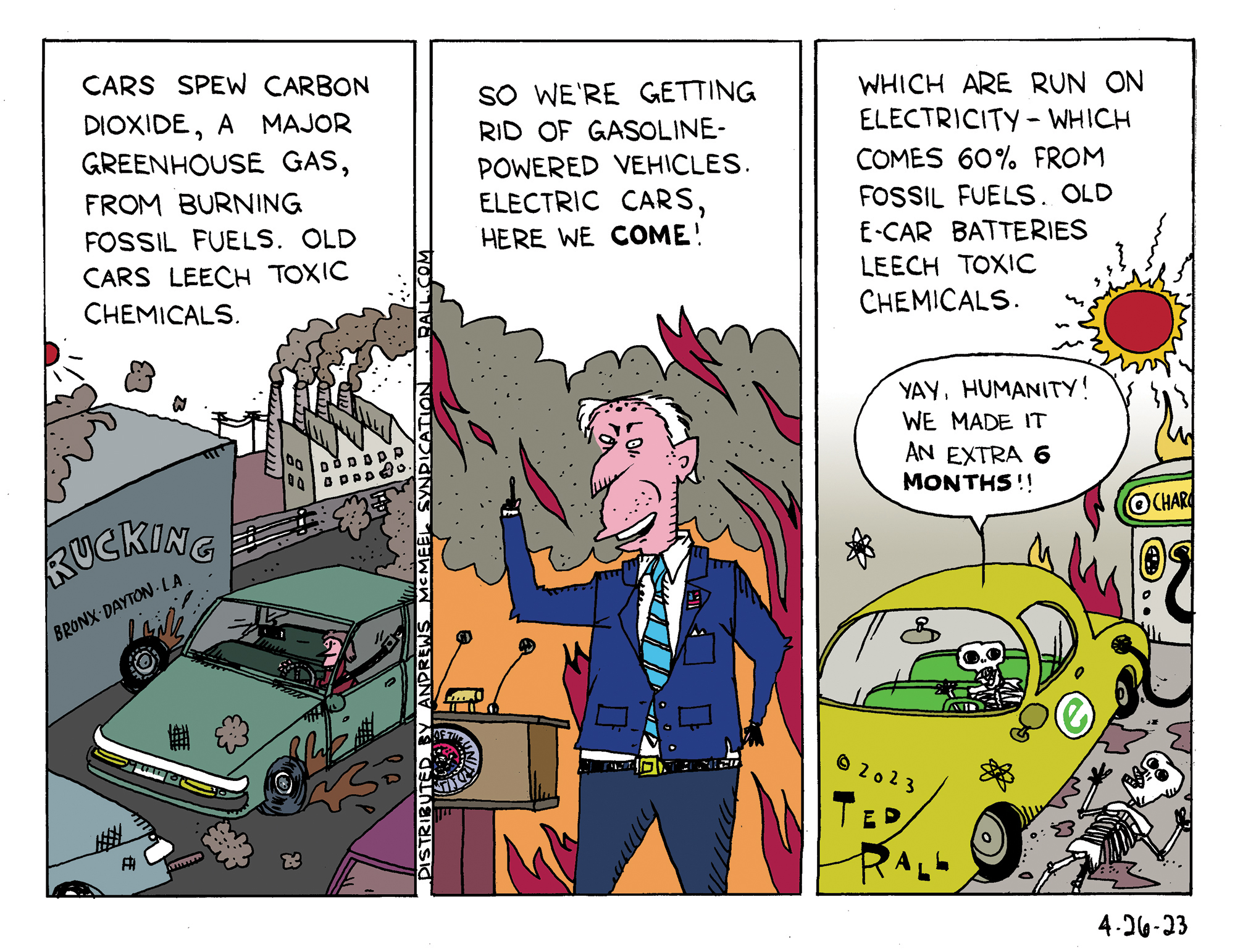Without much reflection, the Biden Administration and the media are rushing headlong into a world that they hope will be filled with electric cars. But the environmental implications of electric cars are much more serious than they are considering.
But Where Does Electricity Come from?

Ted Rall
Ted Rall is a syndicated political cartoonist for Andrews McMeel Syndication and WhoWhatWhy.org and Counterpoint. He is a contributor to Centerclip and co-host of "The Final Countdown" talk show on Radio Sputnik. He is a graphic novelist and author of many books of art and prose, and an occasional war correspondent. He is, recently, the author of the graphic novel "2024: Revisited."

6 Comments. Leave new
In the narrow sense there is a method to this madness: fossil fuel power plants are far more efficient than internal combustion engines even when factoring in losses from electricity transmission. Electric cars are simpler to build, have fewer moving parts, and capture some of the energy released in breaking. It eliminates air pollution from car exhausts (but not from rubber tires which also causes lung problems that shave off 1-2 years of life expectancy).
Apart from minor rebuilding of infrastructure, i.e. redesign petrol stops into charging stations. it leaves 95% of the overall system untouched.
We could have invested a lot more money into state-run R&D into alternatives to Litium batteries. Haha, no, that would be industrial planning, so 1960s. Let the market come up with those batteries and pillage third world countries for their Litium until the Chinese will flood the market with cheap alternative batteries in a few years and Tesla will come running to the Nanny State for a cry.
We could have standardized electric batteries so that we swap out a depleted battery for a full unit at a swapping station in 5 seconds. Haha, no, that would be a communal solution, an individual owns his battery and has to wait for it to charge.
We could have done away with most of the asphalt, rubber tires, metals, etc. that go into individual transport and instead design a much more efficient and healthy system from the ground up, centered around walking, cycling, actually cool mass transit, maybe golf-cart like individual transport in a pinch. Haha, no, what are you, a solarpunk-eco-communist?
Hmm .. It feels like we’re mailing it in a little bit lately. C-
It would be great if we had solutions that were home-run effective with no serious side effects. Got any?
In the meantime, our choice is between mediocre solutions with non-trivial side effects … and doing nothing. I think that we should do our best with the slim pickings, as imperfect as they are, as we continue striving to find better solutions.
No Lee you don’t understand. When Ted talks about a problem but doesn’t offer solutions (or is flat out nonsensical), he accomplished his goal of “making you think.” This gives him cover to write anything about anything. Because see, it made you think.
Ted’s making a good point. Usually, when we as a nation address a problem, we take a “there’s only one fix” mindset, which is almost always wrong. School shootings? Okay. Guess what. The solution isn’t “outlaw guns” nor is it “better mental health care.” The solution is both. “We need a much more aggressive, comprehensive, and rational system of gun control as well as a major improvement in mental health. At the same time, schools have to stop being places where students are bullied and harassed. A student starts screwing with another student? The teacher should be able to come down on the bully with both feet. Automatic suspension, court intervention, etc.” Instead, we have to listen to teenagers. “I was in a school where five kids were shot. That, somehow, makes me an expert.”
My mother’s ghost notes that you conflated “leech” and “leach.” A “leech” is a bloodsucking insect. Toxic chemicals “leach” into the environment. Other than that, keep up the good work!